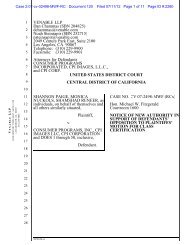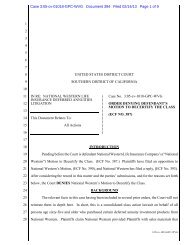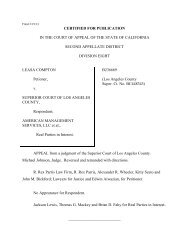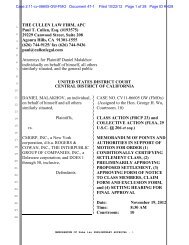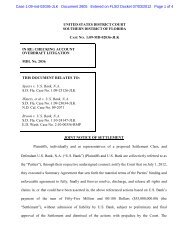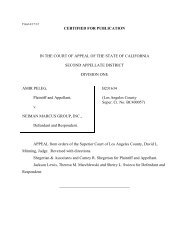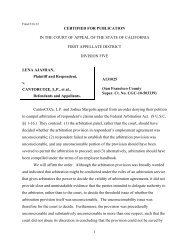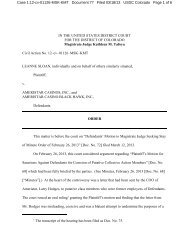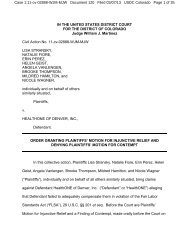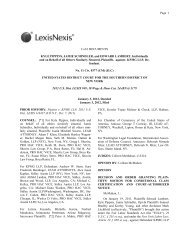order denying motion to compel arbitration - Impact Litigation Journal
order denying motion to compel arbitration - Impact Litigation Journal
order denying motion to compel arbitration - Impact Litigation Journal
Create successful ePaper yourself
Turn your PDF publications into a flip-book with our unique Google optimized e-Paper software.
Case3:12-cv-05109-SI Document68 Filed04/03/13 Page3 of 13<br />
1<br />
2<br />
3<br />
4<br />
5<br />
Concepcion, 131 S. Ct. 1740, 1746 (2011); Moses H. Cone Mem’l Hosp. v. Mercury Constr. Corp., 460<br />
U.S. 1, 24-25 (1983). Federal courts are required <strong>to</strong> rigorously enforce an agreement <strong>to</strong> arbitrate. See<br />
Hall Street Assoc., L.L.C. v. Mattel, Inc., 552 U.S. 576, 582 (2008). Courts are also directed <strong>to</strong> resolve<br />
any “ambiguities as <strong>to</strong> the scope of the <strong>arbitration</strong> clause itself . . . in favor of <strong>arbitration</strong>.” Volt Info.<br />
Sciences, Inc. v. Bd. of Trustees of Leland Stanford Jr. Univ., 489 U.S. 468, 476 (1989).<br />
United States District Court<br />
For the Northern District of California<br />
6<br />
7<br />
8<br />
9<br />
10<br />
11<br />
12<br />
13<br />
14<br />
15<br />
16<br />
17<br />
18<br />
19<br />
20<br />
However, the strong presumption in favor of <strong>arbitration</strong> “does not confer a right <strong>to</strong> <strong>compel</strong><br />
<strong>arbitration</strong> of any dispute at any time.” Volt, 489 U.S. at 474. The FAA provides that <strong>arbitration</strong><br />
agreements are unenforceable “upon such grounds as exist at law or in equity for the revocation of any<br />
contract.” 9 U.S.C. § 2. Arbitration agreements may be invalidated by “‘generally applicable contract<br />
defenses, such as fraud, duress, or unconscionability,’ but not by defenses that apply only <strong>to</strong> <strong>arbitration</strong><br />
or that derive their meaning from the fact that an agreement <strong>to</strong> arbitrate is at issue.” AT&T Mobility LLC<br />
v. Concepcion, 131 S. Ct. 1740, 1746 (2011) (quoting Doc<strong>to</strong>r’s Assoc., Inc. v. Casarot<strong>to</strong>, 517 U.S. 681,<br />
687 (1996)). This is because “<strong>arbitration</strong> is a matter of contract and a party cannot be required <strong>to</strong> submit<br />
<strong>to</strong> <strong>arbitration</strong> any dispute which he has not agreed so <strong>to</strong> submit.” United Steelworkers v. Warrior & Gulf<br />
Navigation Co., 363 U.S. 574, 582 (1960). Accordingly, the Court reviews <strong>arbitration</strong> agreements in<br />
light of the “liberal federal policy favoring <strong>arbitration</strong> and the fundamental principle that <strong>arbitration</strong> is<br />
a matter of contract,” and therefore the Court “must place <strong>arbitration</strong> agreements on an equal footing<br />
with other contracts and enforce them according <strong>to</strong> their terms.” Concepcion, 131 S. Ct. at 1745-46<br />
(quotations and citations omitted).<br />
21<br />
22<br />
23<br />
24<br />
25<br />
26<br />
27<br />
DISCUSSION<br />
I. Unconscionable Arbitration Agreement<br />
In Concepcion, the lower courts had relied on a California Supreme Court case, Discover Bank<br />
v. Superior Court, 36 Cal. 4th 148 (2005), which created a rule that prohibited as unconscionable class<br />
action waivers in <strong>arbitration</strong> agreements. The Concepcion Court explained that when a rule “prohibits<br />
outright the <strong>arbitration</strong> of a particular type of claim,” then it is preempted by the FAA. 131 S. Ct. at<br />
28 3



